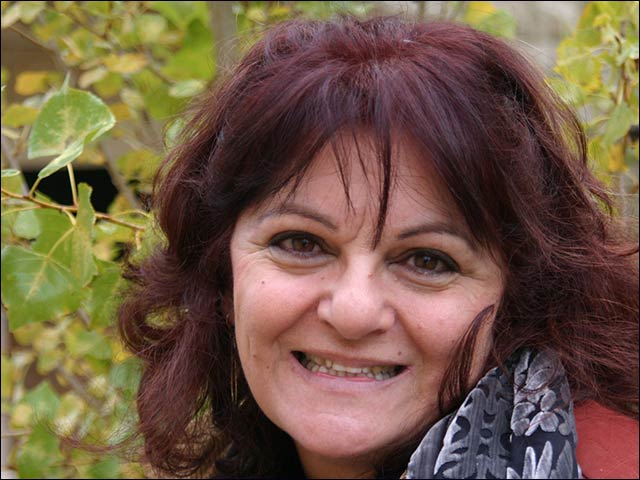By Avigayil Kadesh
If you haven’t heard of Hannah Maisel, Rivka Ziv and Rachel Yanait Ben-Zvi, you’ll have a chance to learn all about these Israeli pioneers in about two years’ time.
Yael Nitzan estimates it will take about that long to turn an empty 200-year-old sheikh’s palace in Haifa into the Museum of Israeli Women, assuming she can raise $6 million to finance the project.
Nitzan, a feminist TV producer, art historian and author, has spent years gathering ideas for the museum and making a list of the women to be featured in its exhibitions.
Though Israel reportedly has the world’s highest ratio of museums per person, none is dedicated to the women who served its defense, agricultural, educational, political and artistic needs.
“There’s nothing quite like Israel in the world and nothing quite like the women of Israel,” she says.
Even the better known of the 40 women on her list have interesting facts in their biographies that many people don’t know.
“Golda Meir was born in 1898,” says Nitzan. “She brought $100 million to Israel -- $50 million at the beginning of the War of Independence and $50 million after. [David] Ben-Gurion asked her to go to America, and she gathered small groups of women in every town to solicit funds. So actually, women built Israel.”
Teachers, soldiers, physicians and farmers
Several years ago, a friend invited Nitzan to a lecture by Israeli historian Esther Carmel-Hakim, a foremost expert on the women of Israel. Now Carmel-Hakim is helping Nitzan choose the women to include in the future museum.
Esther Carmel-Hakim, Israel’s foremost expert on women’s history
Number one on her own list is Hannah Maisel (1883-1972), one of the eight personalities whose biographies she penned for the online
Jewish Women’s Encyclopedia. Carmel-Hakim did her PhD dissertation on Maisel, who established farms and agricultural schools for women in the Palestinian Mandate territory between 1911 and 1926. Later she helped found the Women’s International Zionist Organization (WIZO) with Rivka Ziv (Rebecca Sieff), who also established what later became the renowned Weizmann Institute of Science.
Carmel-Hakim relates that in the 1930s, more than 20 percent of the physicians in Palestine were female, and female dentists outnumbered male dentists. This was due to the immigration of many highly educated women from Germany and other Western European countries prior to World War II.
The wife of Israel’s first president, Vera Weizmann, was an immigrant physician who helped in the rehabilitation of those injured in the War of Independence, raised funds to establish the Tel Hashomer Hospital, and worked on behalf of Youth Aliyah. She was also among the founders of WIZO.
Bringing women into the collective memory
Carmel-Hakim is currently researching North American women who left comfortable lives to help found the state. One of these was Dorothy Bar-Adon, a journalist from Atlantic City, New Jersey, who joined the staff of the Palestine (now Jerusalem) Post in 1933.
Students in Carmel-Hakim’s “Women in Israel” class at the University of Haifa International School travel to the Rishon Lezion Museum, where they can learn about the country’s first female kindergarten teacher, Esther Shapira; and to the Ayalon Institute near Rehovot, where women manufactured bullets in a secret underground factory for the War of Independence.
Carmel-Hakim feels that women shouldn’t be relegated to only one museum. She’s working to get notable female Israelis added to the permanent displays in relevant museums of all kinds because she feels they are sorely underrepresented.
“I will help Yael in any way I can to bring women into our collective memory and educational system,” she pledges.
“I’m trying to put Shulamit Goldstein, the first female pilot, in the Air Force Museum,” Carmel-Hakim says. This 1914 Ukrainian immigrant learned to fly in a course in Egypt. Later on she joined a work brigade at
Rosh Pina, taught nursery school (future Prime Minister Ehud Olmert was among her pupils), ran a poultry farm and manufactured fiberglass.
Alternative to the Israel Prize
Nitzan, a former IDF captain, notes that some 4,000 women served in the Jewish Brigade of the British army, including Sonia Peres, the late wife of Israeli President Shimon Peres. “Five women from this corps became founders of the women’s division of the Israeli army,” she says.

Yael Nitzan, founder of the museum
The Museum of Israeli Women will include a memorial to the hundreds of female soldiers who fell during their military service, and Nitzan envisions hosting courses for female officers there.
Nitzan, who produced about 45 films and 100 TV shows over a 25-year career in broadcast journalism, curated a Haifa exhibition of 50 female artists to mark International Women’s Day last March 8. The city of Haifa will purchase her personal archives on Israeli women to install in the future museum for which she will serve as director.
She has many plans for the venue.
“We want to do an annual convention about women, and we want to give a prize. Only 10% of Israel Prize winners have been women, yet about 80% of Israel’s artists are women,” says Nitzan, the author of several books on Israeli art and artists.